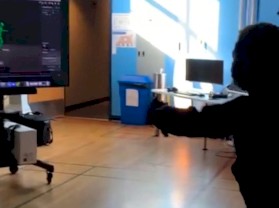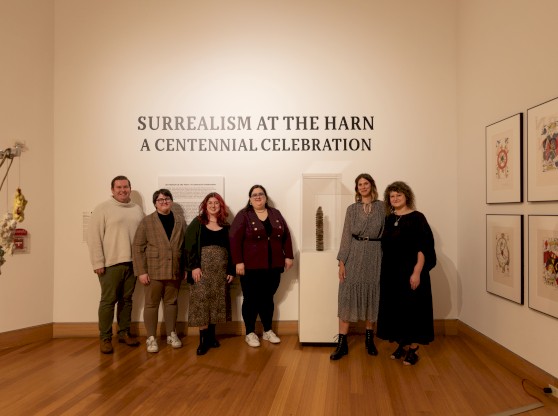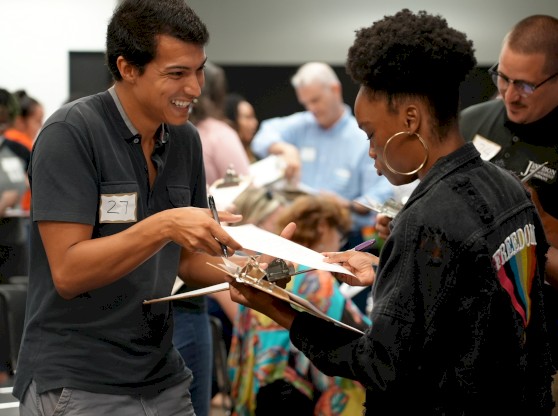The University of Florida Digital Worlds Institute at the College of the Arts is launching its Blockchain Lab, supported by the Algorand Foundation, to expand blockchain education for UF students and global users of Algorand technology.
Associate Professor of Digital Arts and Sciences Marko Suvajdzic is principal investigator of a year-long grant that will establish the lab, which will develop student and professional courses, sponsor university competitions and host student club activities.
The Algorand Foundation awarded Suvajdzic the $270,000 grant from the education and community category of its 250 million ALGO Grants Program.
“The creation of the Blockchain Lab at UF marks a significant moment in the history of the university, akin to the first labs dedicated to internet technology in the mid-90s,” Suvajdzic says. “Collaboration with Algorand Foundation is especially important, as it provides UF with an outstanding partner capable of dreaming big, and, even more importantly, capable of delivering on those dreams. Together UF and Algorand are set to trace the path to the future of blockchain education.”
In the lab’s first year, Suvajdzic will work with Tim Difato, acting director of Digital Worlds, to produce and design six online courses focused on blockchain technology.
Two of the courses will be accredited UF undergraduate classes. Suvajdzic will create an online version of his current Blockchain Innovation in Digital Arts and Sciences class and will add a new course on blockchain development.
Four additional non-credit courses will be tailored specifically to the use of Algorand technology and available to the general public. Suvajdzic says the lab’s mission is to offer accessible and open-source blockchain education to everyone free of charge.
“By bringing together the diverse talents of UF faculty, students and professional staff in a multifaceted collaborative environment, the Blockchain Lab will serve as a platform for interdisciplinary teaching and learning,” Suvajdzic says.
The Blockchain Lab will also support student activities and sponsor a Blockchain/Algorand Network category at the annual Big Idea Gator Business Plan Competition, hosted by the Entrepreneurship and Innovation Center at the Warrington College of Business to help students grow business ideas.
“This year we are excited to collaborate with the Blockchain Lab and the Algorand Foundation to support the growth of blockchain-based startups on the UF campus,” says Jamie Kraft, director of the center. “The Blockchain Lab will provide expert consultations to the student entrepreneurs on campus, while Algorand will provide a technology platform to build upon it.”
Suvajdzic, who also serves as the entrepreneur in residence at the center, says the lab will provide the next generation of blockchain engineers, entrepreneurs and visionaries with the skills and knowledge to be successful in the new digital economy.
“Blockchain is one of the three emerging technologies—along with extended reality and artificial intelligence—that will dramatically redefine the next 25 plus years,” Suvajdzic says. “All three technologies are both the subject of study and the tools of creation in digital arts and sciences.”
Blockchain is a digital database that allows information to be used and shared simultaneously within a large, decentralized and publicly accessible network. For the arts, blockchain can be both a medium for artmaking and a tool for influencing and managing art markets.
Traditional visual arts practices generally involve an artist making an original of their work or having control over the number of copies, Suvajdzic says. A painter, for example, might create a single work on canvas that is regarded as original. Printmakers or film photographers can produce any number of original impressions or prints of their choosing, but they retain ownership of the matrix or film negative that the prints originate from.
Digital art on the other hand can be reproduced infinitely, making it difficult to prove who created the work and who purchased or owns it. This creates challenges for digital artists interested in monetizing their work. How does a consumer know the work is authentic? And why would they buy something that can be copied with a click of a mouse?
With blockchain technology, artists can register digital files, making it possible for others to verify the authenticity of the work and confirm who owns it. This could create digital scarcity—much like a photographer can choose to develop a limited number of prints—and therefore demand.
Tools like non-fungible tokens, or NFTs, can be a proof of ownership that is encoded in the blockchain. While anyone could screenshot a picture of the digital art piece, the blockchain confirms who purchased or created the work.
“Blockchain technology creates opportunities for artists to track ownership, attribution, and sales of their work, increasing access to digital art economies and driving entrepreneurship,” says Sophia Acord, associate dean for research and strategic initiatives at the College of the Arts. “Mastery of this technology and the tools that it creates will position students to be leading creators and collaborators in the 21st century.”
Difato says educating students about blockchain technology and empowering them to use is critical to the Digital Worlds Institute’s mission.
“Digital Worlds is committed to providing cutting-edge, 21st-century opportunities to our students, faculty, and community,” Difato says. “Blockchain and cryptocurrency are therefore vital to the evolution and expansion of that mission. We are extremely excited to partner with Algorand on this innovative grant, which will help elevate the next generation of artists and developers.”
About Algorand Foundation
The Algorand Foundation is dedicated to fulfilling the global promise of blockchain technology by leveraging the Algorand protocol and open-source software, which was initially designed by Silvio Micali and a team of leading scientists. With core beliefs in the establishment of an open, public, and permissionless blockchain, the Algorand Foundation has a vision for an inclusive ecosystem that provides an opportunity for everyone to harness the potential of an equitable and truly borderless economy.



